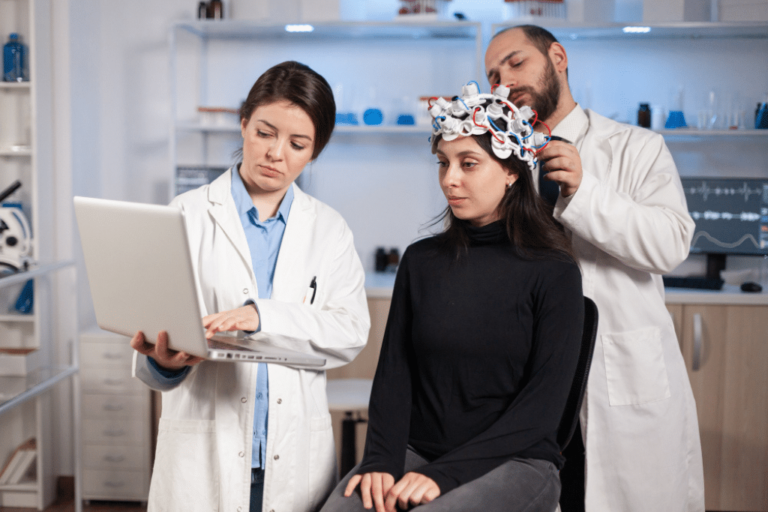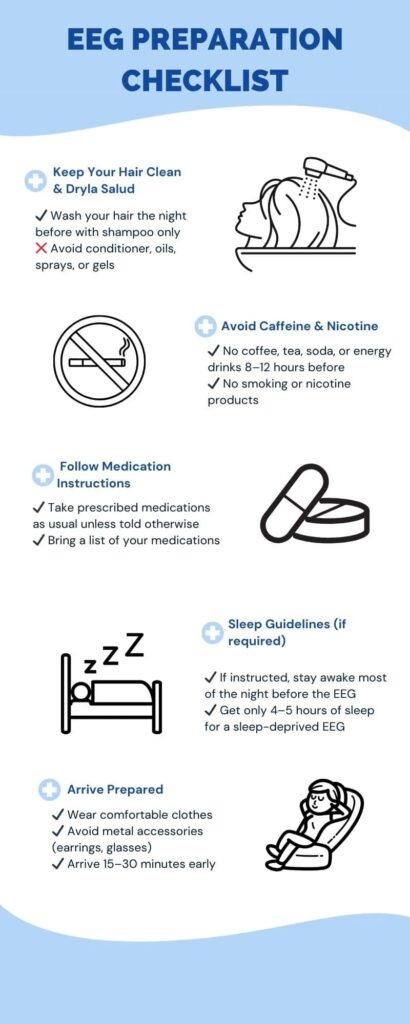
Has your doctor scheduled an EEG (electroencephalogram), and you’re wondering how to prepare? It’s completely normal to feel a little unsure before any medical test. But don’t worry—an EEG is painless, non-invasive, and straightforward.
Your preparation can directly affect the accuracy of the test results, so it’s important to follow the right steps. In this guide, we’ll walk you through everything you need to know, from how to prepare to what happens during and after the procedure.
Let’s get started!
What Is an EEG and Why Is It Performed?
An EEG measures the brain’s electrical activity through small sensors (electrodes) placed on your scalp. This test is often used to detect irregular brain wave patterns and diagnose various neurological conditions.
How Does an EEG Work?
Your brain cells communicate using electrical impulses. These impulses create patterns that an EEG can record. By analyzing these patterns, doctors can determine whether your brain activity is functioning as expected.
Common Conditions Diagnosed with an EEG
Doctors may recommend an EEG if they suspect conditions such as:
- Epilepsy – EEGs help identify seizure activity and determine the best treatment.
- Sleep disorders – Conditions like insomnia, sleep apnea, and narcolepsy may show abnormal brain activity.
- Stroke or head injuries – An EEG can detect changes in brain function following trauma.
- Dementia and cognitive decline – EEGs help doctors assess memory and cognitive issues.
Want to learn more about what the test involves? Explore our EEG testing services to understand how this non-invasive procedure supports accurate brain diagnosis.
Want to Understand More About Neurological Tests?
Preparing for your EEG is an important step, but it’s just one part of the bigger picture in understanding your brain health. If you’re curious about other neurological diagnostic tests—what they are, how they work, and why they matter—take a moment to explore our detailed guide on Understanding Neurological Diagnostic Tests: Everything You Need to Know.
This resource will help you see how EEG fits into a comprehensive approach to diagnosing and managing neurological conditions, so you feel empowered and informed throughout your health journey.
How to Prepare for an EEG?
Proper EEG prep instructions are essential to getting accurate results. Here’s what you need to do:
1. Keep Your Hair Clean and Free of Products
Electrodes must adhere properly to your scalp, so your hair should be clean and dry.
✔️ Wash your hair the night before using mild shampoo.
❌ Avoid using conditioner, oils, or styling products, as they can interfere with the test.
2. Avoid Caffeine and Nicotine Before the Test
Caffeine and nicotine can alter brain activity, so avoid them for at least 8–12 hours before your EEG.
✔️ Skip coffee, tea, soda, energy drinks, and nicotine-based products.
3. Take Your Prescribed Medications as Directed
Some medications can impact brain activity.
✔️ Take your medications normally unless instructed otherwise by your doctor.
✔️ Bring a list of medications you’re currently taking to your appointment.
4. Follow Sleep Guidelines if Required
In some cases, sleep deprivation is necessary for the test.
✔️ Stay awake most of the night before the EEG.
✔️ Get only 4–5 hours of sleep if your doctor requests it.
Why? Sleep deprivation can make abnormal brain activity easier to detect during the test.
Once you’re ready and fully prepared, don’t wait—book your EEG test now and take control of your brain health with Neurology Mobile.
What to Expect on the Day of Your EEG
1. Arriving at the EEG Testing Facility
- Arrive 15–30 minutes early to complete any necessary paperwork.
- Wear comfortable clothes, and avoid wearing metal accessories like earrings or glasses.
2. Placement of Electrodes and Setup
- A technician will place small metal electrodes on your scalp using a special adhesive.
- The electrodes do not cause pain; they simply record your brain’s electrical activity.
- The test usually takes 30–60 minutes.
3. During the Test: What Happens?
- You’ll be asked to relax and stay still while recordings are taken.
- You may be asked to breathe deeply, close your eyes, or look at flashing lights to test different responses.
- If your EEG includes a sleep test, you may be allowed to take a short nap.
Looking for an EEG Test Near You?
Now that you know how to prepare for an EEG properly, the next step is finding a reliable and convenient place to get the test done. If you’re wondering, “Where can I get an EEG test near me?”, we’ve got you covered.
Check out our comprehensive guide on EEG Test Near Me to discover trusted providers, understand costs, and learn what to expect from your EEG experience. It’s the perfect companion to help you take the next step confidently toward better brain health.
EEG Equipment Comparison: In-Lab vs. At-Home EEG Devices
If you’re considering at-home EEG monitoring, here’s a comparison of traditional in-clinic EEGs vs. modern at-home options:
|
Feature |
In-Lab EEG |
At-Home EEG |
|
Accuracy |
High (supervised by medical professionals) |
Moderate (depends on device) |
|
Comfort |
Electrodes applied by a technician |
Self-applied electrodes |
|
Cost |
Covered by insurance (in most cases) |
Out-of-pocket expense |
|
Convenience |
Requires an appointment |
Can be done anytime |
|
Best For |
Diagnosing complex neurological conditions |
Long-term monitoring for epilepsy/sleep disorders |
💡 Always consult your doctor before choosing an at-home EEG device!
Now that you know how to prepare for the test, take a moment to discover the advantages of EEG testing and how it can help uncover key neurological insights.
Post-EEG Instructions and Next Steps
1. Resuming Normal Activities
✔️ You can return to normal activities immediately after your EEG.
❌ If you were sleep-deprived, avoid driving and get some rest.
2. When to Expect EEG Results
- A neurologist will analyze the recordings and discuss the results with you.
- If abnormalities are found, further tests or treatments may be recommended.
Final Thoughts & Next Steps
Preparing for an EEG doesn’t have to be stressful. By following these simple EEG prep instructions, you’ll help ensure accurate results and a smooth testing experience.
Have more questions? Don’t hesitate to ask your doctor or EEG technician before your test.
Now that you know how to prepare for an EEG, you can walk into your appointment feeling confident and ready!
Frequently Asked Questions (FAQs) About EEG Preparation
How Do You Prepare for an EEG test?
Here’s a final checklist:
📝 Quick Prep List:
No caffeine 8 hours before
Wash hair, no products
Take your usual meds (unless advised otherwise)
Sleep well the night before
Wear comfy clothes (no metal)
If you’re wondering, “how do you prepare for an EEG?”, this list has you covered.
Can I take my medication before the EEG?
Yes, in most cases, you should continue taking your prescribed medications unless your doctor instructs you otherwise. Some medications can influence brain activity, so always inform your doctor about any medications you’re taking before the test.
EEG Procedure Steps & Set Up
Wondering what happens during the test?
You’ll lie down or sit in a relaxed position.
A technician will place small electrodes on your scalp using a special adhesive or cap.
You’ll be asked to stay still, open and close your eyes, and possibly do breathing exercises or look at flashing lights.
The test usually lasts 30 to 60 minutes.
The EEG set up is simple and non-invasive. The technician will remove the electrodes afterward and you can return to your regular activities.


